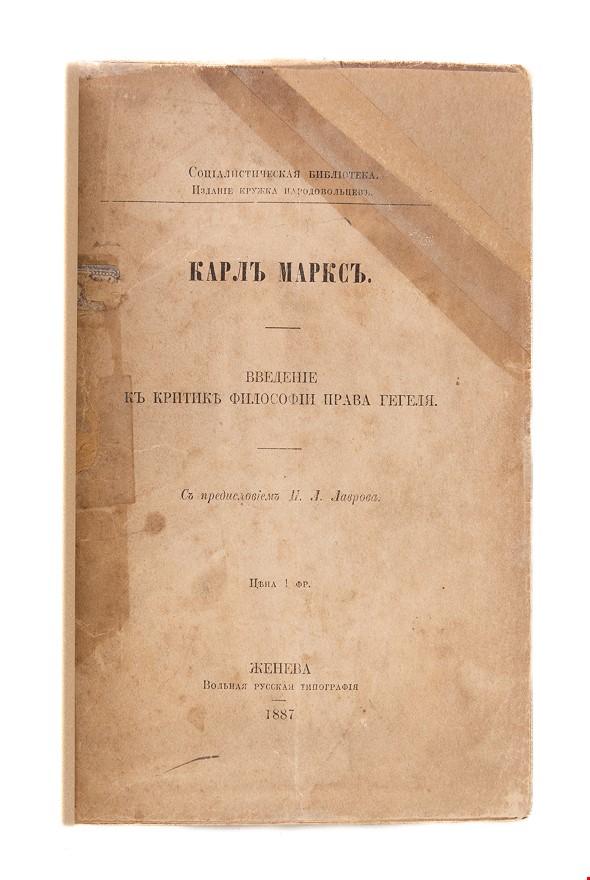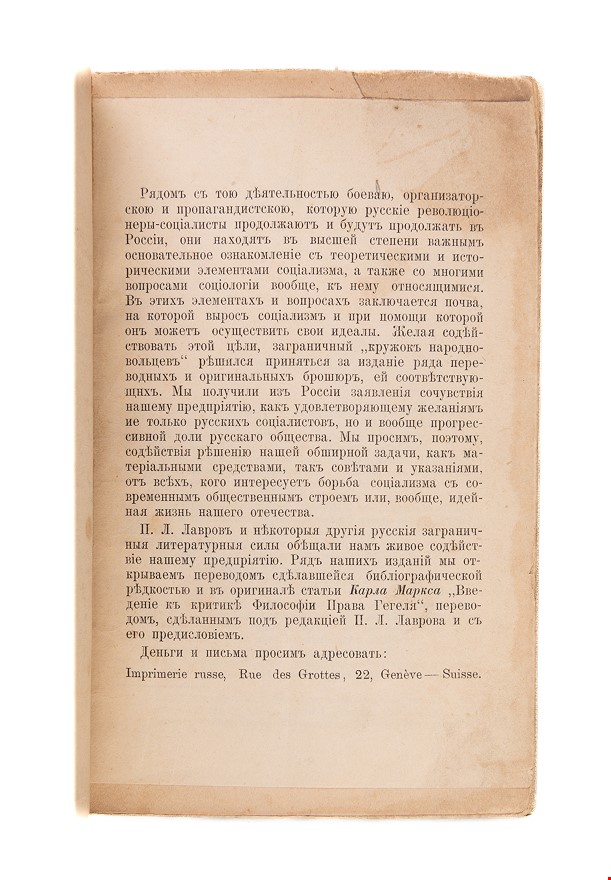Vvedenie k kritike filosofii prava Gegelya.
MARX Karl (1887)
£6500.00 [First Edition]
Please contact us in advance if you would like to view this book at our Curzon Street shop.
RELIGION “IS THE OPIUM OF THE PEOPLE”; TRANSLATED BY LENIN’S OLDER BROTHER
First edition in Russian. 8vo. 47, [1, blank, pasted to inside rear wrapper] pp., with a single leaf printed on recto only tipped-in after the title page. Recent plain buff paper wrappers, housed in a functional cloth backed folding Esher case. Terminal leaf pasted to inside rear wrapper, obscuring the final blank page, top corner of title page remargined with diagonal stain from old tape repair, remnants of small contemporary label to title, further tape residue to gutter of title and terminal leaf. Geneva, Vol'naya russkaya tipografiya, Sotsialisticheskaya Biblioteka, Izdaniye Kruzhka Narodovoltsev.
The first translation into any language of Marx's introduction to his Critique of Hegel's Philosophy of Right, the only part of the work published within Marx's lifetime and the source of his famous statement "Die Religion ... ist das Opium des Volkes", translated anonymously into Russian by Lenin's older brother Aleksandr Ilyich Ulyanov (1866-1887) and published in the same year as his execution for the attempted assassination of Tsar Aleksandr III of Russia.
The introduction was originally published in February 1844 under the title 'Zur Kritik der Hegel'schen Rechts-Philosophie. Einleitung' in the first and only issue of the Deutsch–Französische Jahrbücher, a short-lived periodical published in Paris under the editorship of Marx and Arnold Ruge. This short 14* page essay presents as a cohesive whole, but in reality belongs to a voluminous manuscript commentary on paragraphs 261-313 of Hegel's Grundlinien der Philosophie des Rechts (1821) prepared by Marx during the summer of 1843 when he was 26 years old. Marx had initially intended to revise the manuscript for publication but abandoned the project shortly after the appearance of the introduction in the Deutsch–Französische Jahrbücher and apparently made no subsequent effort to return to the work. The entire manuscript was not published until in 1927, appearing in the first volume of the Marx-Engels-Gesamtausgabe.
Despite the fragmentary nature of the text, the introduction published in 1844 remains of utmost theoretical importance and Marx himself would refer to it twice in later writings in terms suggesting its importance in the development of his thought. It stands as Marx's first substantial published engagement with Hegelian philosophy - a theme that would preoccupy him throughout his life - and contains the earliest formulation of his theory of alienation.
The present Russian translation was undertaken anonymously by Lenin's older brother Aleksandr Ilyich Ulyanov (1866-1887) on behalf of a small group narodniki active in Saint Petersburg. Roughly translatable as 'populists' (although the name bears little resemblance to the modern use of the term), the narodniki were a Russian revolutionary movement that represented a form of agrarian socialism. They intended to avoid the development of industrial capitalism in Russia altogether and instead believed in 'the people', insisting that the transformation of society would begin with the peasantry in the countryside. The movements early methods of societal change included the 'Going to the People' movement in which young radicals travelled to rural parts of Russia to spread their revolutionary message amongst the peasantry. However, after the failings of this approach their emphasis shifted to more short-term violent insurrectionary and terrorist acts.
The prominence of the movement peaked in the years between 1879 and 1881 with the formation of Narodnaya Volya ('People's Will'), Russia's first organised revolutionary party, and the group's subsequent successful assassination of Tsar Aleksandr II of Russia on March 1, 1881. The assassination of the Tsar ultimately backfired in political terms insofar as the extreme violence of this terrorist act alienated the majority of ordinary Russian's from the movement and invoked the fearful revenge of Aleksandr II's son and heir Aleksandr III on the revolutionary movement, with the majority of the prominent leaders of Narodnaya Volya being executed or exiled shortly thereafter, effectively disabling the group as an effective organisation within Russia.
The present publication therefore appeared during a challenging period for the narodnik movement. Despite the effective dissolution of Narodnaya Volya as an organisation, young radicals would continue to refer to themselves as narodovoltsy, forming small discussion groups and cells throughout the 1880s. The small group joined by Aleksandr Ulyanov in mid-1886 was led by student radicals Orest Govorukhin and Pëtr Shevyrëv. Although they initially started as a student reading group, a small cell of core members emerged within the group in the winter of 1886 intent on the assassination of Emperor Aleksandr III. "Until Govorukhin's group grew up in 1886, there had been no serious enterprise of the sort for five years" (Service, p. 55).
Aleksandr Ulyanov was radicalised as a student at Saint Petersburg Imperial University in the Faculty of Mathematics and Physics. Much like his younger brother Vladimir Ilyich Ulyanov, best-known by the pseudonym Lenin, Aleksandr was a prodigious student. He was therefore a useful recruit for the terrorist cell: "he had the inestimable advantage of being a scientist with a practical knowledge of chemistry; they wanted him to make up the nitroglycerine for the bomb with which they planned to kill the Emperor. Also important was Aleksandr's facility with language. They wanted his help with the production of propaganda explaining the political objectives of the group" (Service, p. 54).
To this end, Aleksandr was charged with providing the final literary elaboration of the group's new ideology. In the years between 1881 and 1886 a wide split had emerged between the traditional agrarian ideology of the narodniki and the growing influence of Russian revolutionary Marxism as expounded by Georgi Plekhanov's Emancipation of Labour group in Geneva. It is in this context that the present translation of Marx issued by a group of narodniki is significant; traditionally the movement had been influenced more by provincial Russian socialists and even anarchism rather than the brand of 'scientific' socialism represented by Marxism. The notion of scientific 'laws' within Marxism in particular appealed to Aleksandr's background in the natural sciences. Along with the present translation of Marx, Aleksandr also co-authored the group's Program which was purposively designed to appeal to this new generation of Russian Marxists.
The present copy of Aleksandr's translation of Marx includes a highly interesting separately printed leaf tipped-in after the title page comprising a 'mission statement' of sorts by a self-described "circle of émigré narodovoltsy" based in Geneva. The text provides important insight on the motivation of Aleksandr's group and their interactions with other narodnik sympathisers in Russia and abroad.
In the first instance, it reveals that the group had acquired a name; the "Circle of Narodovoltsy" (Naimark, p. 217). Police investigation of the group's activities in Saint Petersburg had intensified over the winter of 1886 and, at the beginning of 1887, Orset Govorukhin and several other prominent members fled to Switzerland. The group received significant support from the émigré Russian community in Switzerland, including veteran narodniki who had fled Russia after 1881, and aimed to establish themselves as "the new rallying point for Russian revolutionary activities in Europe" (Naimark, p. 217).
In aid of this goal, the text of the 'mission statement' places particular emphasis on the role of the publication and proliferation of socialist texts, declaring the present translation of Marx by Aleksandr Ulyanov to be the first in a project series of books. The literary efforts of the group benefited from the support of the veteran Russian revolutionary and Marxist philosopher Pyotr Lavrovich Lavrov (1823-1900), who edited Aleksandr Ulyanov's translation and provided a preface to the text.
Lavrov had been one of the major theorists of the narodnik movement during its traditional phase during the 1870s. He had been sentenced to internal exile in the Russian Empire for his political activities in 1867 but was able to escape to Paris where he was present at the Paris Commune in 1871. Lavrov left Paris in mid-April 1871 shortly before the defeat of the Commune, departing for London where he met with Marx and Engels, with whom he established strong and enduring, "if not always cordial or friendly, relations" (Naimark, p. 122). Lavrov's first-hand account of the Paris Commune would no doubt have been of much use to Marx, who was at the time writing his hugely important political pamphlet The Civil War in France (1871). Lavrov would become one of the central figures of the Russian revolutionary émigré community in Europe and, after the effective dissolution of Narodnaya Volya in 1881, focused his efforts on unifying the disparate and even conflicting factions of Russian socialism during the 1880s, hence his support for the "Circle of Narodovoltsy" in Geneva.
The selection of Marx's introduction to the Critique of Hegel's Philosophy of Right as the group's first publication also undoubtedly owed much to Lavrov's influence. Despite the importance of the text to Marx's intellectual development, it would remain relatively obscure in revolutionary circles during Marx's own lifetime. Indeed, the 'mission statement' leaf makes reference to the original German text being a bibliographical rarity in its own right. However, the text was likely known by Lavrov through his personal acquaintance with Marx but also on account of Lavrov's own deep knowledge of Hegelian philosophy, having written numerous books and articles on the subject from as early as the 1850s.
Propaganda aside, it was during this period that the "Circle of Narodovoltsy" ramped up their efforts to assassinate Tsar Aleksandr III. With the emigration of prominent members of the group, the leaders of the plot within Russia became Pëtr Shevyrëv and Aleksandr Ulyanov. In a particularly morbid symbolic gesture, the date set for the assassination was to be 1 March 1887 - the sixth anniversary of the assassination of the previous Tsar.
The assassination attempt was, however, a complete disaster for the conspirators. "One of them was already in the last stages of tuberculosis and another left the country at the last moment. The group nonetheless went ahead on the day, but luck played into the hands of the authorities. Two members were picked up in suspicious circumstances and the attempt to blow up the Emperor had to be abandoned. The Okhrana, the government’s secret police, interrogated the arrested men and succeeded, one by one, in apprehending virtually all the group’s members. Aleksandr Ulyanov was among them. The interrogations revealed everything the police needed to know, and when Aleksandr Ulyanov saw this he took an exceptionally brave decision. First, he determined to take the blame even for aspects of the conspiracy that did not involve him. Second, he made up his mind to use his trial as an opportunity to disseminate the basic ideas of the revolutionaries, an opportunity denied him in the legal press because of the official censorship. This decision, he knew, would probably cost him his life" (Service, p. 57)
Aleksandr Ilyich Ulyanov was executed on 20 May 1887. He was twenty-one years old while his younger brother Vladimir Ilyich was only sixteen. He would go on to be known as Lenin - the most famous of the 160 pseudonyms he used throughout his lifetime. Revolution was to become the family business.
See: Norman M. Naimark, Terrorists and Social Democrats: The Russian Revolutionary Movement Under Alexander III; Robert Service, Lenin: A Biography.
Bert Andréas, Karl Marx / Friedrich Engels: Das Ende der klassischen deutschen Philosophie. Bibliographie, IV, 22; Kenneth E. Carpenter, Russian Revolutionary Literature Collection, Houghton Library, Harvard University: A Descriptive Guide and Key to the Collection on Microfilm, p. 39.
Stock Code: 244225





